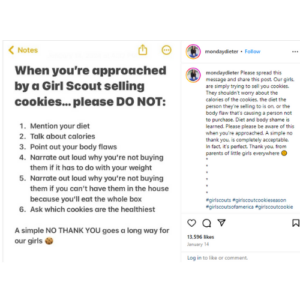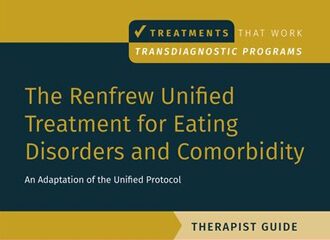Published by: USA Today
Written By: Sarah Al-Arshani
It’s Girl Scout cookie season and scouts across the country are raising funds through the organization’s famed boxes of sweet treats. But as booths pop up in communities all over, one mom wants buyers to be careful about what they say in front of young girls selling cookies.
Nicole Romanella O’Neal shared advice on Instagram in January asking people to avoid talk of diets and calories when approaching Girl Scouts.
In O’Neal’s post, she specifically pointed out things to not do when buying cookies, which included:
- Mentioning your diet
- Talking about calories
- Pointing out your body flaws
- Narrating out loud why you aren’t buying the cookies because “you’ll eat the whole box”
- Asking which cookies are the healthiest
“A simple NO THANK YOU goes a long way for our girls,” O’Neal wrote.
Since then, her post has been shared widely across social platforms – with many agreeing, and some disagreeing, with her stance.
Why the mom shared the post
O’Neal, an advocate for disordered eating recovery, told USA TODAY she penned the advice after attending a Girl Scout kickoff meeting with her 6-year-old daughter. During the event, an older scout gave examples of the types of customers young sellers might encounter at a booth, including the “healthy indulgence” customer.
She typed out her feelings on the notes app and posted it to Instagram.
“I am not anti-dieting for individuals, I’m not anti-wellness … the post isn’t about that. It’s about just asking older women and men who are talking to young children, 5 and 6-year-olds to not have to explain why they’re not buying the cookies if that’s the reason. All I said was you can just stop at ‘no thank you.’ You don’t have to give an explanation,” O’Neal said.
‘We can’t have them obsessing over calories’
O’Neal, who grew up struggling with disordered eating, said the issue stems from language and the messages that rhetoric could have on young girls as they develop their relationship with food.
“We can’t have them obsessing over calories and ingredients right now as they’re developing their relationship because, they’re going to be inundated with these messages,” O’Neal said.
She said these girls will eventually come across messages about diet and their bodies, but at such a young age, they shouldn’t have to hear messages that could cause them to have a negative relationship with food.
“If in their formative years, they develop a healthier relationship with their body and those comments won’t trigger them as much. As somebody who didn’t develop a healthy relationship, those comments trigger me more. I look at food as good and bad and it’s detrimental to disordered eating. I don’t want that for my daughter. I don’t want her to obsess about food and dieting the way I have in my life,” she explained.
Young girls are especially at risk for disordered eating
Dr. Samantha DeCaro, the clinical director of outreach and education at The Renfrew Center, an organization focused on eating disorder treatment, told USA TODAY there are several risk factors for developing an eating disorder or disordered eating, including being an adolescent and a girl.
“When we’re thinking about Girl Scouts, what comes to mind for me is that this is a really vulnerable age,” DeCaro said.
She explained that something as simple as going on a diet could trigger an eating disorder for these young girls.
“It’s estimated that 20 to 25% of dieters will actually go on to develop a clinical eating disorder, and even more will go on to develop disordered eating for years to come,” DeCaro said. “So when I think about the Girl Scouts, I think of a very vulnerable population who may be at elevated risk for developing an eating disorder or disordered eating.”
Read the full article here.




